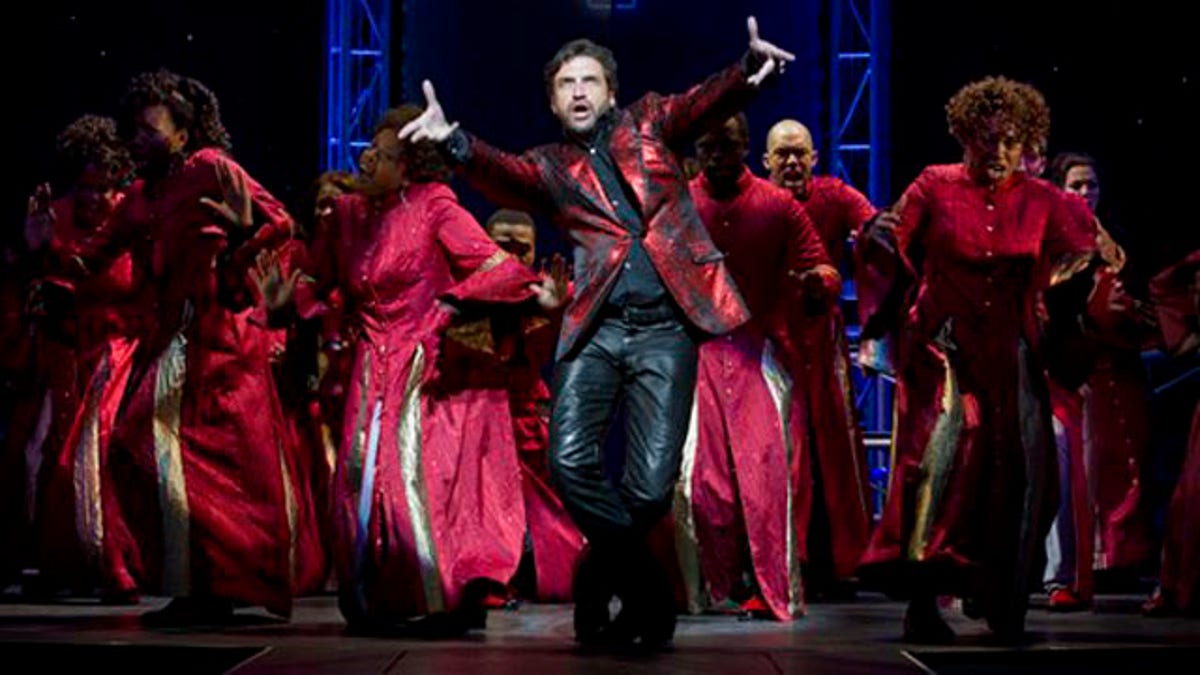
Rául Esparza is shown during a performance of "Leap of Faith," at the St. James Theatre in New York. The production was nominated for a Tony Award for best musical. (AP)
It’s no secret that well-known actors and actresses with big names make news, but what seems to be increasingly obvious for Broadway producers these days is that names also sell tickets. As passersby see a recognizable actor or actress' name lit up on a theater's marquee, their name alone can become a selling point regardless of the play or role.
This isn’t exactly a revolutionary trend in theater as big screen and small screen actors have traded in performing for a camera and opted instead for a live audience. But in anticipation of Sunday night's Tony Awards, even the most novice of theater-goers are likely to see familiar names and faces.
From nominees like Philip Seymour Hoffman, James Earl Jones, John Lithgow and others to Tony Awards host Neil Patrick Harris and special award winner Hugh Jackman, Hollywood's impact on New York’s theater environment is obvious. So what impact is this having on the genre overall? Here's the good, the bad and the ugly:
The Good
Nearly every nominee for best leading actor this year in a straight play is either a film or television star. They are all fabulous actors but I think it also indicates a trend. Clearly, producers see them as box office gold and hope that their presence will always lead to sellout crowds.
For many New York City visitors who might go to one theater performance a year (or even less), the play they choose to see might not be a draw in and of itself but the A-list cast will be. Having that greater reach and drawing a more diverse crowd rather than the typical New York theater-going niche group will, hopefully, create a wider appeal for theater in general. instead of catering to the same people year after year.
It’s good to use events like the Tony Awards to try to educate a public who is not familiar with theater. Certainly, this year's host Neil Patrick Harris will draw more viewers to the Tony broadcast than a well-known Broadway actor whom no one has ever heard of outside of the New York metropolitan area.
Perhaps watching the Tony’s on television will pique the audience's interest enough to go to a live theater performance and more numerous Americans will become supporters of theater.
The nice thing about the Tonys is that they do a fantastic job at capturing the art of theater even if it’s only one day a year.
The Bad
Unfortunately for would-be theater enthusiasts, while big name Hollywood actors are generating more publicity for plays and musicals, they are simultaneously limiting the availability for the general public to go see a live performance.
Why do I say that? Because big names require big price tags and ticket prices can easily soar into the triple digits now. Spending a night in New York City for a family of four can easily exceed $1,000 just to go to dinner and a performance.
Commercial theater is quickly becoming a past time of the elite among us. I worry that a theater experience will no longer be enjoyed for the art and the craft of the production itself. When the focus of the art shifts from creating a stunning performance to maximizing profit margins that is a complete disservice to the audience.
There are all kinds of wonderful regional theaters across the country where new and creative projects are being born, but it seems that Broadway is getting worse at pricing the middle class out of a night at the theater.
The Ugly
For the most part, many on-screen actors and actresses got their start in front of a live audience before they had any big break in Hollywood. Their roots are entrenched in theater so coming back to the stage is natural.
But there are exceptions. Although I’ll refrain from naming specifics, some of the performances by film stars on Broadway have been just dreadful. To some extent, acting is acting but there is certainly a different style between performing for the camera and performing before a live audience on the stage.
Even in those less than stellar performances by Hollywood actors on Broadway, the venue often still sold out and drew thousands of adoring fans simply because of the actor or actress' name. After shelling out so much money to see a performance, the audience’s expectations are bound to be high. They, rightly, want to see both a seasoned professional on stage and also overall high production value.
Most of these Hollywood folks know exactly what they’re doing, but there certainly have been complete bombs on Broadway seeking after the Hollywood boom effect.
There’s a lesson to be learned from the much less expensive London theater scene, where some of the performances are subsidized to make them more accessible to theater-goers of all income levels. What's most admirable is that people in Great Britain grow up going to theater. It’s a part of their lives.
It’s fantastic to see the popularity of live theater continuing to grow in the US. But my hope is that theater producers will strive to ensure that the overall sanctity of the genre does not suffer as a result of adding some Hollywood to the mix.








































